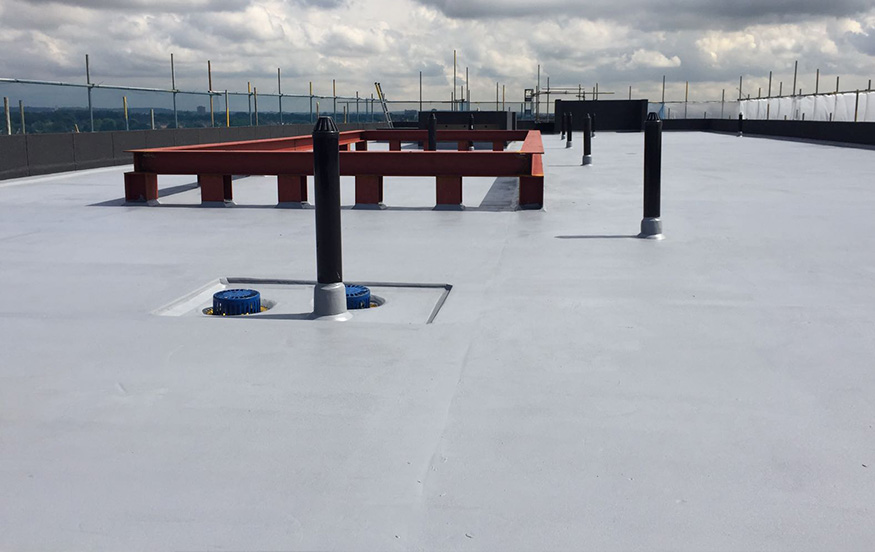Mastic asphalt is commonly perceived as a roofing material for building refurbishment projects, but architects and specifiers are increasingly specifying the material for new build work due to its durability and versatility.
One project which epitomises this is the newly constructed Seven Kings Hotel in Ilford, East London, which is due to open in the first quarter of 2020. Developed by DSJ Homes Ltd, the new three star hotel is located adjacent to Seven Kings railway station which will be served by Crossrail, providing hotel guests with direct access into central London. It replaces the former Joker Pub and now has 95 bedrooms across six storeys, plus a café and bar.
DSJ Homes had originally intended to build flats before deciding to develop the £8 million hotel and specified mastic asphalt for the 500m2 roof, as it is DSJ Homes’ preferred waterproofing system for development projects. Once open, the hotel will operate as a new Ibis Styles hotel and will be run by Accor in partnership with NOVUM Hospitality, one of Germany’s largest family-run hotel companies. NOVUM Hospitality has chosen this hotel as its first foray into the UK market.
This was a demanding project and R J Evans Flat Roofing Limited, a member of the Mastic Asphalt Council (MAC), was selected to apply a mastic asphalt system to the building’s main roof area on the basis of its track record as one of the most established and well proven waterproofing membrane systems available. The build-up of the roof comprised a concrete deck which was primed before the application of a fully bonded vapour control layer. A cut to fall insulation scheme was installed before two layers of mastic asphalt on BSF felt.
Alternative roofing systems such as liquid applied membranes were considered but they were not selected due to the warm deck finish and there were concerns that they would not be robust enough. Mastic asphalt was preferred as the main roof comprises several air conditioning units, solar panels and other plant equipment. The flowing characteristics and seamless nature of mastic asphalt make it far easier for installing contractors to tackle roof surfaces which are complex, stepped or with multiple protrusions.
John Taylor, Contracts Manager at R J Evans Flat Roofing Limited said: “There were a number of challenges during this project, one of which included the weather conditions as mastic asphalt needed to be installed at temperatures as low as -2°C. There were also lifting restrictions on the site so mastic asphalt was installed on the roof from two half tonne pots. The client was looking for a seamless finish and mastic asphalt was able to meet all these challenges, including complex detailing around metal posts as mastic asphalt can be applied and formed to various shapes and sizes.
“Armed with designs and drawings provided by MAC, we had great back-up to achieve the finish and specification required by the architect. Traditionally, mastic asphalt is perceived as a refurbishment system, but we are increasingly finding that it is also being specified as a new build roofing system. For instance, we’ve recently installed a new mastic asphalt roof at Canterbury Cathedral’s Visitor Centre,” he continued.
The sustainability of mastic asphalt is proving increasingly attractive to architects and specifiers and 10 years ago the mastic asphalt sector became the first industry in the world to achieve the CarbonZero standard. Since then mastic asphalt has offset thousands of tonnes of carbon dioxide, helping specifiers to achieve the highest BREEAM rating as mastic asphalt can be integral in any building design where an A+ rating is required. Mastic asphalt is 100% recyclable at the end of its useful life and it is able to be recycled and broken down into hardcore or used in roof screeds.
This article featured in the January Edition of Roofing Today magazine – click here to take a look.

